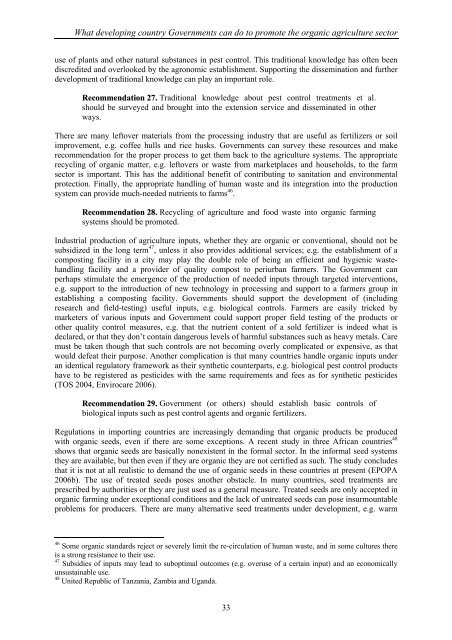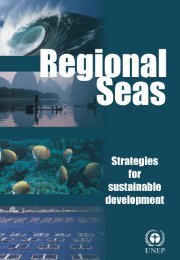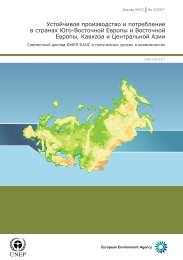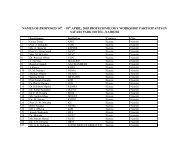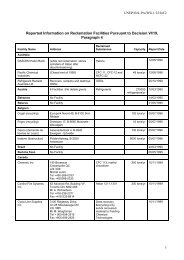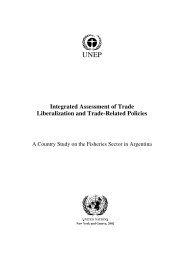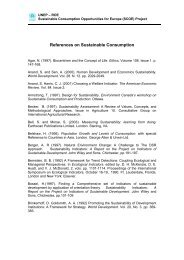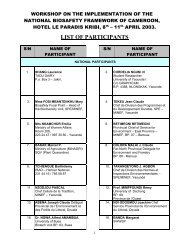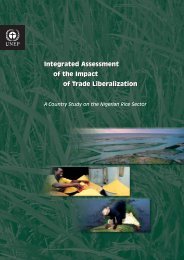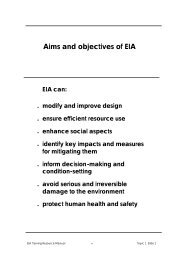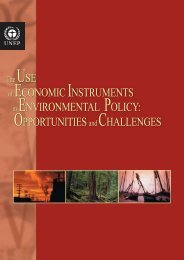Best Practices for Organic Policy - What developing country - UNEP
Best Practices for Organic Policy - What developing country - UNEP
Best Practices for Organic Policy - What developing country - UNEP
Create successful ePaper yourself
Turn your PDF publications into a flip-book with our unique Google optimized e-Paper software.
<strong>What</strong> <strong>developing</strong> <strong>country</strong> Governments can do to promote the organic agriculture sector<br />
use of plants and other natural substances in pest control. This traditional knowledge has often been<br />
discredited and overlooked by the agronomic establishment. Supporting the dissemination and further<br />
development of traditional knowledge can play an important role.<br />
Recommendation 27. Traditional knowledge about pest control treatments et al.<br />
should be surveyed and brought into the extension service and disseminated in other<br />
ways.<br />
There are many leftover materials from the processing industry that are useful as fertilizers or soil<br />
improvement, e.g. coffee hulls and rice husks. Governments can survey these resources and make<br />
recommendation <strong>for</strong> the proper process to get them back to the agriculture systems. The appropriate<br />
recycling of organic matter, e.g. leftovers or waste from marketplaces and households, to the farm<br />
sector is important. This has the additional benefit of contributing to sanitation and environmental<br />
protection. Finally, the appropriate handling of human waste and its integration into the production<br />
system can provide much-needed nutrients to farms 46 .<br />
Recommendation 28. Recycling of agriculture and food waste into organic farming<br />
systems should be promoted.<br />
Industrial production of agriculture inputs, whether they are organic or conventional, should not be<br />
subsidized in the long term 47 , unless it also provides additional services; e.g. the establishment of a<br />
composting facility in a city may play the double role of being an efficient and hygienic wastehandling<br />
facility and a provider of quality compost to periurban farmers. The Government can<br />
perhaps stimulate the emergence of the production of needed inputs through targeted interventions,<br />
e.g. support to the introduction of new technology in processing and support to a farmers group in<br />
establishing a composting facility. Governments should support the development of (including<br />
research and field-testing) useful inputs, e.g. biological controls. Farmers are easily tricked by<br />
marketers of various inputs and Government could support proper field testing of the products or<br />
other quality control measures, e.g. that the nutrient content of a sold fertilizer is indeed what is<br />
declared, or that they don’t contain dangerous levels of harmful substances such as heavy metals. Care<br />
must be taken though that such controls are not becoming overly complicated or expensive, as that<br />
would defeat their purpose. Another complication is that many countries handle organic inputs under<br />
an identical regulatory framework as their synthetic counterparts, e.g. biological pest control products<br />
have to be registered as pesticides with the same requirements and fees as <strong>for</strong> synthetic pesticides<br />
(TOS 2004, Envirocare 2006).<br />
Recommendation 29. Government (or others) should establish basic controls of<br />
biological inputs such as pest control agents and organic fertilizers.<br />
Regulations in importing countries are increasingly demanding that organic products be produced<br />
with organic seeds, even if there are some exceptions. A recent study in three African countries 48<br />
shows that organic seeds are basically nonexistent in the <strong>for</strong>mal sector. In the in<strong>for</strong>mal seed systems<br />
they are available, but then even if they are organic they are not certified as such. The study concludes<br />
that it is not at all realistic to demand the use of organic seeds in these countries at present (EPOPA<br />
2006b). The use of treated seeds poses another obstacle. In many countries, seed treatments are<br />
prescribed by authorities or they are just used as a general measure. Treated seeds are only accepted in<br />
organic farming under exceptional conditions and the lack of untreated seeds can pose insurmountable<br />
problems <strong>for</strong> producers. There are many alternative seed treatments under development, e.g. warm<br />
46 Some organic standards reject or severely limit the re-circulation of human waste, and in some cultures there<br />
is a strong resistance to their use.<br />
47 Subsidies of inputs may lead to suboptimal outcomes (e.g. overuse of a certain input) and an economically<br />
unsustainable use.<br />
48 United Republic of Tanzania, Zambia and Uganda.<br />
33


